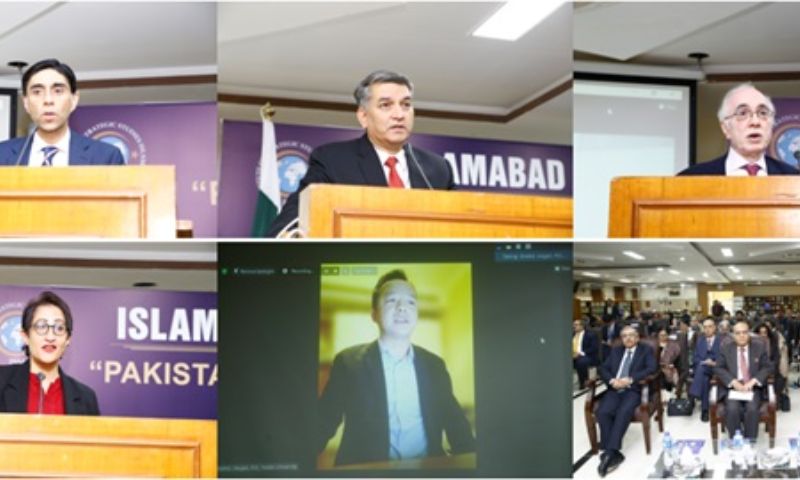ISLAMABAD: In the third working session of the Islamabad Conclave 2023, titled “Navigating Complex Geopolitics: Accentuating Pivot to Geo-economics,” experts delved into the evolving international landscape and the imperative for nations, particularly Pakistan, to shape their foreign policies amidst complex regional and global paradigms. The session, moderated by Dr. Talat Shabbir, Director of the Center for Public Policy and Competitiveness (CPSC), featured distinguished speakers and provided valuable insights into the geo-economic strategies that can advance national interests.
Dr. Moeed Yusuf, Vice Chancellor of Beaconhouse National University (BNU) Lahore, emphasized the critical importance of implementing consensual frameworks for success in the evolving geopolitical scenario. He shed light on the notion of ‘geo-economics’ and noted the misconception surrounding it in the context of Pakistan. Dr. Yusuf advocated for a “cooperative geo-economics” framework, urging a shift from mere debates to practical solutions and problem-solving within this strategic framework.
Ambassador Masood Khalid focused on the Belt and Road Initiative (BRI) as a manifestation of China’s philosophy of win-win cooperation and peaceful coexistence. He highlighted the role of CPEC in aligning with China’s neighborhood policy, emphasizing its positive impact on stability, development, and prosperity in the region.
Ambassador Naghmana Hashmi discussed the parameters of soft connectivity and the role of CPEC in promoting it. She underscored CPEC as a catalyst for internal connectivity and proposed the adoption of a clear tourism policy, including industry status and tax incentives, to further enhance sectoral development.
Dr. Zhang Jiegen, virtually participating from Fudan University in China, drew historical parallels between Pakistan’s current approach to geo-economics and China’s stance during the 1970s and early 1980s. He emphasized the importance of national consensus and the evolving nature of the National Security Policy document in building a unified vision for geo-economics.
Dr. Rabia Akhtar outlined essential prerequisites for operationalizing the pivot to geo-economics. These prerequisites included political stability, rule of law, corruption control, macroeconomic stability, economic diversification, promotion of public-private partnerships, and social security. Acknowledging collective efforts and action, she emphasized the need to identify and execute necessary steps.
The session concluded with a dynamic Q&A session, providing attendees with the opportunity to engage with the esteemed panelists. Chairman of the Board of Governors at ISSI, Ambassador Khalid Mahmood, expressed gratitude by presenting ISSI’s memento to the distinguished speakers. The session garnered significant participation from scholars, academics, researchers, practitioners, students, diplomats, and media representatives, contributing to a comprehensive dialogue on geo-economic strategies.

























